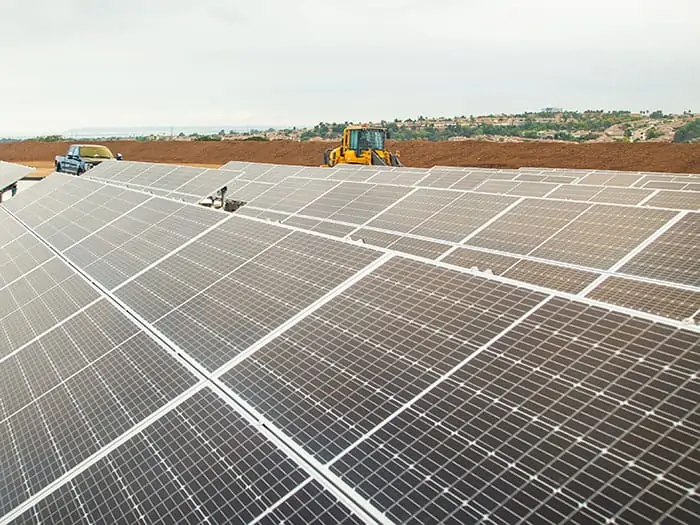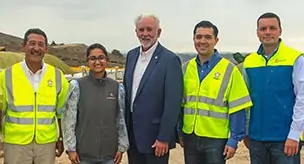


In October, Republic Services’ Otay Compost Facility at the Chula Vista, California, Otay Landfill opened for business. The compost facility helps communities in San Diego County meet the requirements of California’s SB1383 law mandating the diversion of organic waste from landfills.
The composting facility designed by SCS Engineers in collaboration with Sustainable Generation operates completely off the grid using solar energy. It is the first fully solar-powered compost facility in the state and can process 100 tons of organics per day, with plans to double capacity by year-end.
Both organics recycling and reuse leaders, Republic Services hired SCS Engineers to design the Otay Compost Facility. The design uses renewable energy to run 100 percent of the composting operations at the site. The facility design includes using technologies to speed the maturation rates and reduce excessive odors. Blowers to aerate the organic material, oxygen and temperature sensors, and advanced compost cover technology produce a high-quality product.

“Republic’s taken the goals of SB 1383, to reduce emissions of short-lived climate pollutants further. They’re running a sustainable facility that enables residents, businesses, and government to easily reuse and recycle more within a smaller carbon footprint than ever expected,” says Vidhya Viswanathan, engineer and project director.
As California collects and recycles organic materials from homes and businesses, local governments will use the products made from recycled organic material for compost and mulch. Recycling organic waste into compost creates a nutrient-rich soil amendment, preserving natural resources and reducing water consumption working within a circular economy. This California jurisdiction is ready for the SB1383 deadline on January 1, 2022.
“Republic Services supports California’s effort to divert food and yard waste from landfills to facilities such as this one,” said Chris Seney, Republic’s director of organics operations. “We’re grateful to SCS for their partnership in helping us bring this facility, co-located at an active landfill, to reality.”
Please watch the YouTube video to see the facility and learn more about its environmental value.
SCS Engineers is proud of helping our municipal and private clients bring the most value to their environmental solutions and communities. To learn more about SCS Engineers, view our 50th-anniversary video.
Senate Bill-1383 is California legislation establishing aggressive organics recycling targets. Other states are establishing their own goals, some with enforcement components. It is up to municipalities to secure processing capacity and to implement comprehensive organics diversion programs to meet these goals.
Tracie Onstad Bills and Lisa Coelho, both with SCS Engineers, explain how one solid waste authority known as RecycleSmart, is proactively seeking to tackle the tough questions pertaining to new regulation compliance. RecycleSmart’s stance is proactive, they began to research and review their organics programs last year and have been working simultaneously during the formation of the regulations. By doing so, they have given themselves time to establish a direction for compliance and time to provide the public outreach and education necessary for a smooth transition.
Read “Shifting Focus,” an article published in Waste Today detailing the Central Contra Costa Solid Waste Authority’s study and six integrated programs that will provide the direction they need to help six Northern California municipalities make the right infrastructure and programmatic investments to attain the goals.
Learn more about Organics Management and Integrated Solid Waste Management.
Tracie Onstad Bills and Lisa Coelho are the Northern California director and sustainable materials management specialist, respectively, for SCS Engineers. Please feel free to contact us if you have comments or questions about organics program planning and management at .